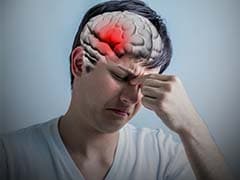World Stroke Day is observed on October 29 to create awareness about this serious health condition. On World Stroke Day 2022, let's understand the risk of brain stroke in women.

World Stroke Day 2022: A stroke is a serious health condition which requires immediate medical attention
Brain stroke cases have risen alarmingly in India over the last few years. A recent survey titled 'The state of stroke: A survey on awareness about stroke in urban India' found that only 68% of females in the country were aware of the term brain stroke in comparison to 71% of males.
It is also observed that brain stroke is the third most common reason for female fatalities. While men experience higher age-specific stroke rates, women experience more stroke incidences due to higher life expectancy rate.
World Stroke Day 2022: Risk factors of brain stroke in women
1. Pregnancy and childbirth: A pregnant woman is three times more likely to have a brain stroke as compared to a non-pregnant woman of the same age. In fact, high blood pressure during pregnancy is one of the leading causes of brain stroke in pregnant women or women who have recently given birth to a child. Additionally, pregnancy increases the tendency of blood to clot more, further increasing the chance of brain stroke. Furthermore, fluctuating levels of progesterone during pregnancy can increase the risk of brain stroke.
2. Hormonal medications during menopause: Hormone replacement therapy in women during menopause can cause blood clots and increase blood pressure. This can contribute to an increased risk of brain stroke among women.
3. Oral contraceptive pills: Women who are on birth control contraceptive pills are more likely to be at an increased risk of brain stroke. It can double the risk of brain stroke, especially in women with high blood pressure.
4. Atrial fibrillation: Atrial fibrillation (A-fib) is often irregular and very rapid heart rhythm (arrhythmia) that can lead to blood clots. While A-fib is common in men too, women often experience A-Fib differently and it is said to increase the risk of brain stroke in women over the age of 75 years by 20%.
5. Migraines: Females have a higher prevalence of migraine and these attacks especially with aura, are associated with higher risk of ischemic stroke in younger women, additionally if they smoke or use birth control pills.
Nonetheless, in spite of many of these non-modifiable stroke risk factors, there are well-defined ways to better manage the risk of brain stroke. It is advisable to lead a healthy lifestyle and focus on:
1. Healthy diet: One should opt for a balanced meal plan which includes whole grains, nuts, healthy fats, fruits, and vegetables and is low in sodium. A balanced diet can not only cater to the nourishment requirements of the body but also support healthy blood pressure and blood sugar levels.
2. Exercising regularly: It is advisable to exercise at least 30 minutes every day as it helps in managing weight and reducing the risk of cardiovascular disease. It can further help in better managing other diseases such as diabetes, hypertension, cholesterol levels thereby, reducing the risk of brain stroke.
3. Avoiding alcohol and tobacco: Avoiding alcohol and tobacco can help in leading a healthier lifestyle and better managing the risk factors associated with brain stroke.
4. Regular medical consultation: For expecting mothers it is recommended to regularly track and monitor blood pressure and blood sugar levels throughout the pregnancy. Therefore, it is paramount to work with the doctor to understand the risk of brain stroke and other complications that may arise during pregnancy.
Women generally tend to neglect their own health while prioritizing the health of their families. They must follow the aforementioned steps for themselves first in order to continue caring for their families by reducing the risk of brain stroke. The same measures, taken to improve the overall health of the family can also help to reduce the risk of brain stroke for themselves.
(Dr Amit Batra is a Neurologist at Max Super Speciality Hospital, Delhi)
Disclaimer: The opinions expressed within this article are the personal opinions of the author. NDTV is not responsible for the accuracy, completeness, suitability, or validity of any information in this article. All information is provided on an as-is basis. The information, facts, or opinions appearing in the article do not reflect the views of NDTV and NDTV does not assume any responsibility or liability for the same.
DoctorNDTV is the one stop site for all your health needs providing the most credible health information, health news and tips with expert advice on healthy living, diet plans, informative videos etc. You can get the most relevant and accurate info you need about health problems like diabetes, cancer, pregnancy, HIV and AIDS, weight loss and many other lifestyle diseases. We have a panel of over 350 experts who help us develop content by giving their valuable inputs and bringing to us the latest in the world of healthcare.














